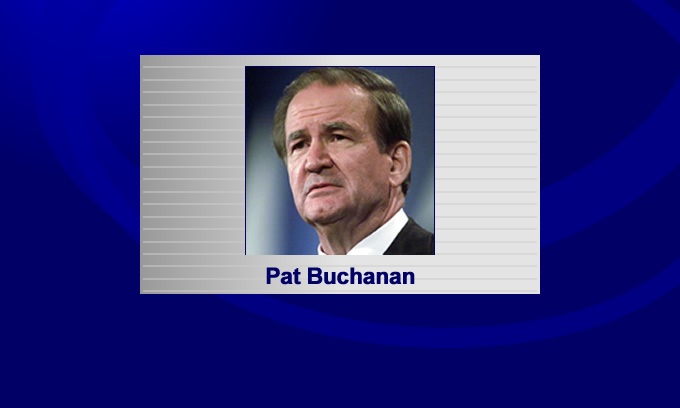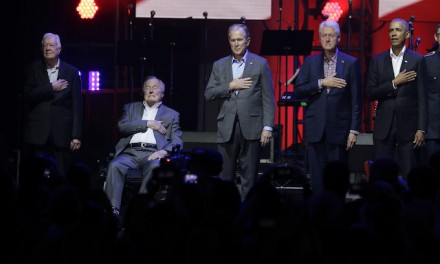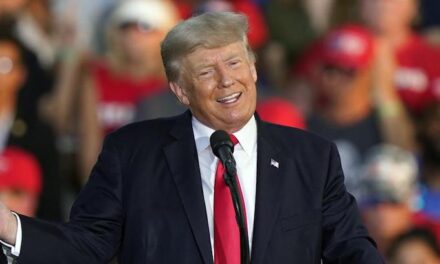At stake in 2016 is the White House, the Supreme Court, the Senate and, possibly, control of the House of Representatives.
Hence, Republicans have a decision to make.
Will they set aside political and personal feuds and come together to win in November, after which they can fight over the future of the party, and the country?
Or will they split apart, settling scores now, lose it all, and, then, after November, begin a battle to allocate blame for a historic defeat that will leave wounds that will never heal.
Republicans have been here before.
After the crushing defeat of 1964, Govs. Nelson Rockefeller, George Romney and William Scranton, whose principles required them to abandon Barry Goldwater, discovered that, when the cheering of the press stopped, they carried the mark of Cain.
As national leaders, they were finished.
Richard Nixon, who had lost to JFK, lost to Gov. Pat Brown, quit politics and moved to New York to practice law, took off two months in 1964 to campaign for Barry Goldwater.
Four years later, with Barry’s backing, Nixon was rewarded with the party’s nomination, and the presidency.
Now between Goldwater and Trump there are great differences. A relevant one is this: Trump still has a chance of becoming president.
In August 1964, Barry was 36 points behind LBJ. As of today, Trump is 10 points behind Clinton. From Harry Truman to George H. W. Bush, many presidential candidates have been able to close a 10-point gap and win.
What does Trump need to do? In the words of Dr. Martin Luther King, “Keep your eyes on the prize” — the presidency. And between Trump and the presidency today stands not Paul Ryan, but Hillary Clinton.
The Donald, his campaign, and party need to cease attacking one another to the elation of a hostile media, and redirect all their fire on the sole obstacle between them and a Republican sweep.
Nor is it all that complex or difficult a task.
For, as secretary of state, Clinton made a compelling case for her being ranked as about the worst in American history.
She began her tenure by breaking State Department rules and setting up a private email server in her home. She compromised U.S. national security, setting off a criminal investigation that ended with the director of the FBI virtually accusing her of lying about everything she told the country about her misconduct.
As of mid-July, 56 percent of Americans thought the Democratic nominee should have been indicted.
She is a compulsive fabricator, telling a harrowing story about running under sniper fire across the tarmac of some Balkan airfield, until TV footage showed her accepting a bouquet from a little girl.
Her “reset” with Russia was brushed aside by Vladimir Putin. Spurned, she now compares him to Hitler. Is this the temperament America wants in the First Diplomat, in dealing with nuclear powers?
She was a cheerleader for a war in Libya that left that nation a hellhole of terrorism, requiring another war to clean up.
“Benghazi” has today become a synonym both for the selfless heroism of American warriors, and for the squalid mendacity of politicians desperate to cover their fannies. Clinton is in there with the latter, accused of misleading families of the fallen about why their sons died.
Twenty years ago, The New York Times’ William Safire called Clinton a “congenital liar.” Has her subsequent career disproven or validated that judgment?
Trump, though, needs not only to make the case against her, but for himself, and for the ideas that vaulted him to victory in the primaries that brought out millions of new voters.
What are they?
Trump will secure the Southern border and halt the invasion of illegal immigrants.
He will throw out the Obama tax and trade policies that have betrayed American workers and bled us of our manufacturing power. In all future trade deals, Americanism will replace globalism as our guiding light.
Where Clinton regards Ruth Bader Ginsburg as her model Supreme Court justice, Trump’s nominees will be in the tradition of Justice Antonin Scalia.
“America First” will be the polestar in foreign policy. Cold War commitments dating to the 1950s, to fight wars for freeloader nations, will all be reviewed. Allies will start standing on their own feet and paying their fair share of the cost of their own defense.
As for the defense of the United States, Peace through Strength, the Eisenhower policy, will be the Trump policy. And as our strength is restored, Trump will, like Ike, Nixon, Reagan and Bush I, negotiate with enemies and adversaries from a position of strength. But we will negotiate.
America’s era of endless wars — is coming to an end.
Where Clinton will continue all of the policies that produced the unacceptable present, we will change Washington as it has not been changed since Ronald Reagan rode in from the West.
As for the renegade and cut-and-run Republicans who just won’t come home, as they say at Motel 6, “We’ll leave the light on for you.”
Patrick J. Buchanan is the author of the new book “The Greatest Comeback: How Richard Nixon Rose From Defeat to Create the New Majority.” To find out more about Patrick Buchanan and read features by other Creators writers and cartoonists, visit the Creators website at www.creators.com.
COPYRIGHT 2016 CREATORS.COM



















Recent Comments